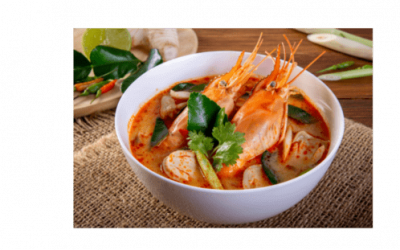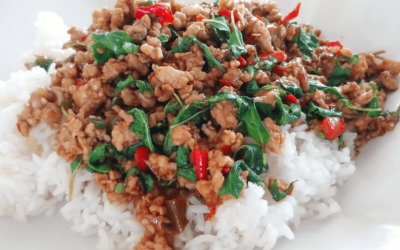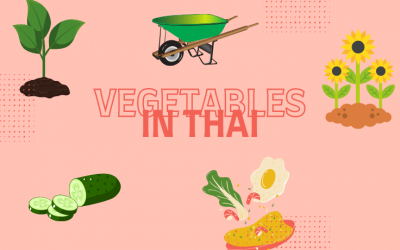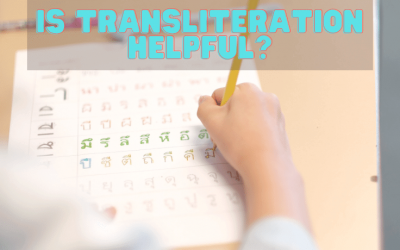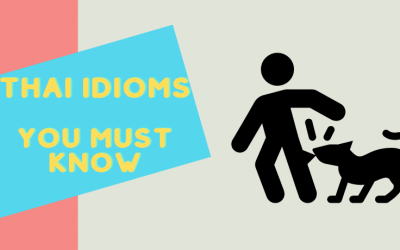Blog
What does Tom Yum mean? ต้มยำ
If you know about Thai cuisine, you have probably heard about ต้มยำ (Tom Yum or you might see Tom Yam). Tom Yum is a spicy and sour soup that is made with lemongrass, galangal, lime leaves, lime juice, and fish sauce. It also usually has mushrooms and different herbs....
What does Pad grapao mean? ผัดกระเพรา
One of the most popular everyday dishes that Thai people eat is Pad grapao (pàt grà-prao). This dish is what you would consider "fast food" in Thai. In Thai, it's spelled ผัดกระเพรา (pàt grà-prao) or sometimes spelled ผัดกะเพรา (pàt gà-prao). You might...
Useful Thai prefix: ช่าง châang
The word ช่าง châang has a few different meanings in Thai. For example, it can mean a mechanic or technician, it can mean "truly". It can also mean to "forget it" as in "its not important" by saying ช่างมัน (châang man). However, in this article, I want to talk about...
Airplane and Airport vocabulary in Thai
In this article, I will teach you many vocabularies related to airplanes and airports in Thai. This will be useful if you are going to the airport anytime soon in Thailand. Let's start with vocabularies in Thai related to the airport. Airport vocabularies in Thai...
Possessive Pronouns in Thai
Possessive pronouns are, for example, "My mom", "Mom's cat", "Your car", etc. In Thai, it's very easy. How to form Possessive Pronouns in Thai When it’s a simple sentence, you just say the word and the pronoun. (This is when the context is clear). Examples: My...
Third person pronouns in Thai (he, she) | “She” isn’t “Ter”!
Third person pronouns in Thai are not hard but can be a little bit confusing. In this article, we will clear that doubt, and I will also explain the common mistake that foreigners like to make when learning Thai. Check out the video version of this article above and...
Uses of เนี่ย (nîia)
เนี่ย (nîia) is a very useful commonly used Thai particle that you must know to sound like a Thai. You might see this word all the time, but you aren't sure on how to use เนี่ย. There are 3 uses of เนี่ย that I will explain in this article. To introduce a subject You...
Different ways to say “You” in Thai (Second person Pronouns in Thai) | Not just ‘kun’
If you have studied Thai, then you know that คุณ (kun) means "you". But did you know there are other ways to say "You" in Thai that will make you sound more like a native? In this article, I will cover the second person pronouns "you" in Thai....
How to say “I/me” Like a Thai (Personal Pronouns in Thai) | Not just chan and pom!
If you have learned Thai from a book, you would see that ฉัน (chăn) and ดิฉัน (dì-chăn) is "I" for women and ผม (pŏm) is "I" for men. They are not wrong, but there are many more ways to say "I" to make you sound more like a real Thai. In this article, I will explain...
Garden words and vegetables in Thai
In this article, I will cover many useful words you need to know regarding garden words and vegetables in Thai I recommend you also watch my video on this topic here, where I show you my garden. Download the video transcript here:...
Learning Thai using transliteration – GOOD or BAD?
Learning to read Thai characters is a challenge. Because of this, many Thai learners try to avoid learning to read and instead use the English alphabet to write down Thai words. For example, instead of สวัสดี (the word for "hello") they will write down sawatdee (or...
Thai idiom you must know – เดินตามผู้ใหญ่หมาไม่กัด
In This article, we will talk about an important idiom that all Thai people know. Therefore, you also have to know it. It is : เดินตามผู้ใหญ่หมาไม่กัด (dern dtaam pôo yài măa mâi gàt) What does เดินตามผู้ใหญ่หมาไม่กัด mean in English?...

